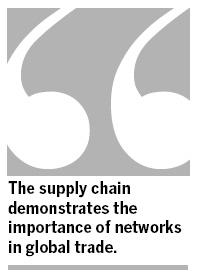Opinion
Understanding global supply chain
By Andrew Sheng (China Daily)
Updated: 2010-07-12 14:19
 |
Large Medium Small |
Being a large city in the Western and inland region, Chongqing is less dependent on exports and more on domestic consumption and investment. Having invested in good infrastructure, the city's priorities are now to tackle crime and make the city greener.

Recently, the city began to attract electronics manufacturers that assemble PCs and other high value items, from the coastal areas. This is particularly clever, because PCs, handphones, e-books and tablets are high value items and, as long as there is good airfreight that connects to the major overseas markets, these factories need not be located in the coastal areas.
A small difference in wages would induce the electronics companies to shift their production location since they operate with low margins. What they need most of all is lots of good engineering graduates and critical mass in supporting industries.
It is very clear that the Chongqing municipal government has understood the importance of geography in the global supply chain and has gone out to attract all the key factories into the city. What I thought was amazing was that Chongqing has begun to understand that supply chains operate not only in private sector manufacturing, but also government service as part of the supply chain.
As we all know, the assembly line was invented by Henry Ford, who found that training workers to work in a supply line and specialize in one part of the operation could make manufacturing cars more efficient.
Very soon, manufacturing companies also began to integrate upstream and downstream to dominate the supply chain and to control the distribution chain. The largest food companies in the world are agri-food ventures like Nestle, which control the key brands and are global in production.
The supply chain demonstrates the importance of networks in global trade. Cities are simply nodes in these trade, manufacturing and distribution networks. The cities in the coastal areas invented the idea of the one-product city, such as specialists in batteries or lighters, because the cities realized that if production was specialized and clustered together, you get economies of scale from design, production, assembly, research and ultimately distribution.
What most people did not realize was how important the government is in the design and construction of the supply chain. Supply chains do not grow spontaneously. They grow and extend in geography because East Asian cities found it beneficial to attract specific industries through special development zones that reduce transaction costs, have superior infrastructure and also critical mass in cheap labor and talented management. Chinese supply chains prospered because of cheap labor, but also very high technical and managerial skills because of good university education.
| ||||
By ensuring that there is ample skilled labor supply, cutting down taxes and improving customs clearance, licensing and even inspection or enforcement action, they can improve efficiency of the supply chain so that both the private sector and public sector win.
For example, if it is critical that ex-factory, high quality products reach the airport and clear customs in 24 hours for direct airfreight to export markets, Chinese supply chains can beat most competitors because of superior delivery times.
The success of supply chains comes from the fact that products are rapidly designed, manufactured and delivered to the customer in style, quantity and quality that the market wants. Those supply chains that do not have enough customers cannot compete and simply die.
But in addition to supporting and encouraging the growth of private sector supply chains, I believe that there is increasing awareness that government services are also a supply chain, with the citizen as customer. The issue is how government services can be delivered to the citizen quickly and efficiently, with minimum transaction costs, high transparency and reliably.
The answer is in good feedback mechanisms that monitor what the citizens want. Clearly, Chongqing understood that what the citizen wants is good public security/less crime and also a better living environment.
The author is adjunct professor at Tsinghua University.


